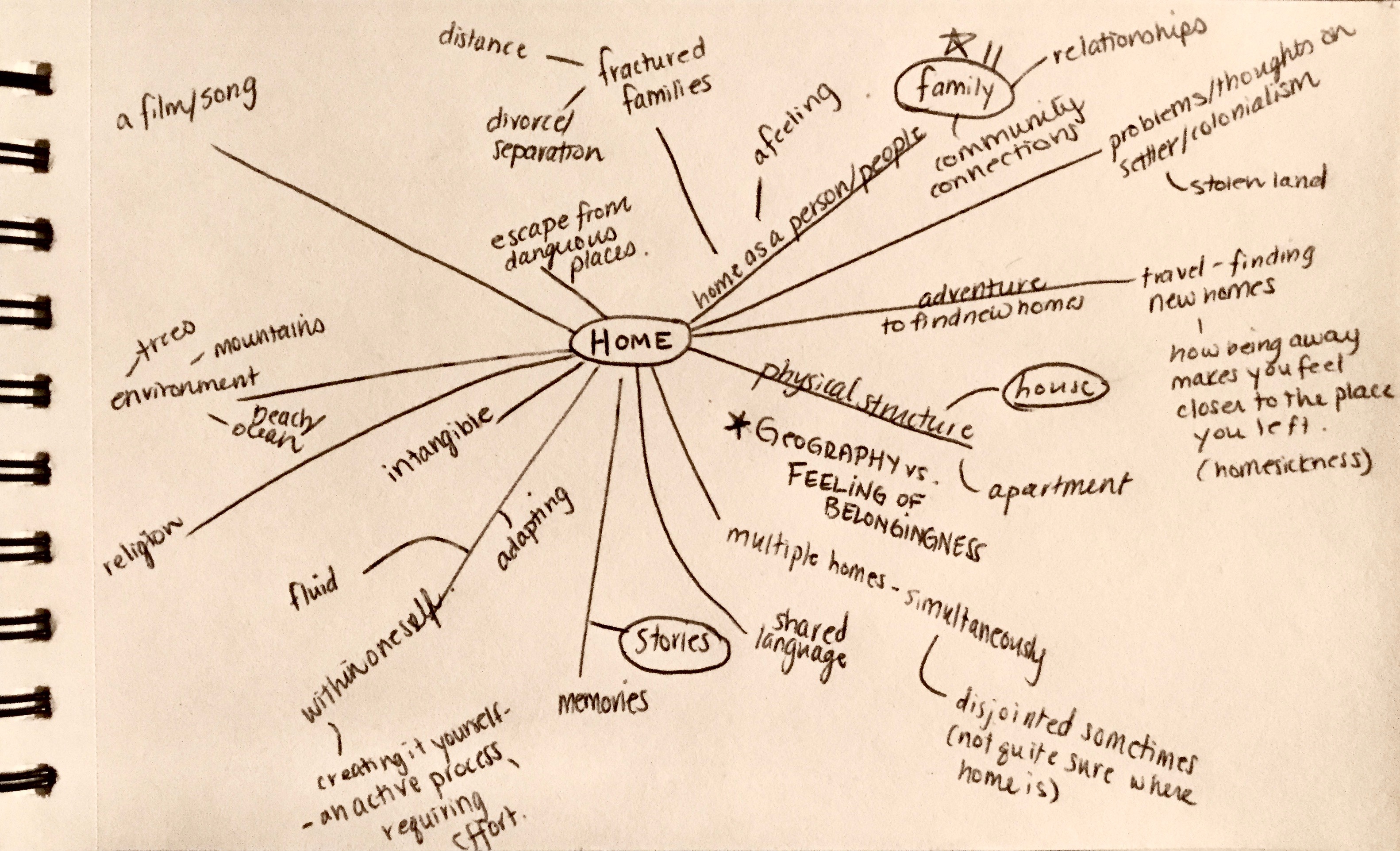Read at least 6 students blog short stories about ‘home’ and make a list of the common shared assumptions, values, and stories that you find. Post this list on your blog with some commentary about what you discovered.
Hi all. I wanted to thank everyone for their beautiful words. I started out reading the 6 blogs required of us, but getting to learn so much about everyone was so fascinating that I think I ended up reading almost all of them (at least from January 30th and earlier). Getting an opportunity to hear both how everyone came to be where they are today, as well as everyone’s diverse writing styles and how we positioned ourselves within, or outside of, our short stories was compelling.
While I was reading everyone’s blogs, I made a little mind map of the values and assumptions that crept up; I find that when reading digitally, I like to make notes by hand, so I’ve taken a photo of what I made and I’ll expand on it here in list form.

Common themes:
- Home as a person or people –
- Family or a partner: many of the blogs I read focused on their perception of home as the relationship they share with another person, whether that person is a mum or dad, brother or sister, extended family members, or a collection of all of these people.
- Community: I also noticed that several people pointed out their community as being vital to their sense of home. Developing and maintaining a sense of connectedness and belonging to one’s community appeared as a shared value.
- Home as a place in the traditional sense of the word (a family house, apartment, etc.): I wasn’t surprised that this was a recurring image of home for many people. I think for many people who grew up in one main childhood house, the abundance of memories of the house itself, especially to a younger mind, can leave lasting impressions on us as to what “home” means. I also noticed that many students didn’t grow up in the safety (or complacency – depending on how you want to look at it) of one home, and many people moved around frequently as they grew up (to different continents, countries, provinces, cities, and neighbourhoods) for a variety of reasons. I appreciate those of you who shared your stories of heartbreak, where you were forced (or your family chose to leave) to leave your physical homes because of war, limited opportunities, or death.
- Home as something natural/wild/found in nature (trees, mountains, beaches, etc.): When I read a number of short stories where nature and the natural world were seen as home, I wondered if this response would be less prevalent in other countries? Canada, and particularly the west coast, is infamous for its immense and beautiful landscape, and I’d guess that more people who live on the coast view the land as more welcoming (homey), than perhaps those who live in a more stark, frigid environments. I’m making a general assumption here, so I could be totally wrong, but at least for me, growing up in Alberta, my affiliation and love of the land grew exponentially when I moved to Victoria. Mind you, that may simply be personal preference, as I also know a number of people who moved up North to the territories and fell absolutely in love with the land and all that it offers to them.
- Finding home in one’s religion or spiritual practices: this was one that came up in a few different ways, and was a value that deviated from mine. It was an interesting glimpse into another perspective and I wanted to thank Simran Chalhotra for sharing about the meditation centre: I loved reading about it because it was such a new concept for me.
- The idea of multiple homes, chronologically as well as simultaneously – many people, including me, questioned whether we could have one home at a time, or if it was possible to have several simultaneously. I recently read an Atlantic article about the psychology of home and one line stuck out for me: ““Looking back, many of my homes feel more like places borrowed than places possessed.” This statement resonated with me in that I think of myself as becoming part of a place for a moment in time, until I’m ready to “borrow” another place for a time. It’s the people I bring into this place that make it a home more than the place itself.
- Home as memories (a film or a song, memories of a place): Kevin Hatch brought up how he associated the guitar riff from the 1994 Spiderman with home, and while I didn’t explicitly include this notion in my own short story, reading his words reminded me of how powerful some sounds, textures, and smells are in bringing up memories of home. In my story, I mention the smell of my mum’s chocolate chip cookies, and how this smell, combined with the greasy feeling of the 20-year-old recipe card that we still use to this day, arouses memories of my childhood home.
- Home as within one’s self – and the intangibility of this feeling
- The sense of home becoming more powerful when one leaves (to travel and embark on new adventures): Verlyn Klinkenborg, in The Smithsonian Magazine, writes of home as “a place so profoundly familiar you don’t even have to notice it,” and it’s only when we leave it that we become fully aware of it. I found this notion came up several times for me, as well as while I was reading other people’s blogs. For many of us, it took an extended period away from our homes, usually our first big trip, to understand the hold “home” had (and has) on us.
I also wanted to briefly comment on how frequently homelessness came up as I read. I am lucky in that I wasn’t really able to relate to many of my peers in this sense, having almost always felt at home somewhere, whether in a physical place or within a relationship with family. I compiled a list of the features of homelessness that I noticed:
- Fractured families – through the ending of relationships, or through physical distances
- Language – not feeling at home in a foreign place because language barriers; the struggle to communicate easily with others can be isolating
- Leaving a beloved home out of necessity – may it be to escape a dangerous situation, or to seek a new beginning
- Confusion and uncertainty in general about what home is supposed to be, based on traditional assumptions of home and how these traditional features may not fit with one’s lifestyle or memories.
Works Cited
Beck, Julie. “The Psychology of Home: Why Where You Live Means So Much.” The Atlantic, Atlantic Media Company, 29 Dec. 2011, www.theatlantic.com/health/archive/2011/12/the-psychology-of-home-why-where-you-live-means-so-much/249800/. Accessed 1 Feb. 2019.
Klinkenborg, Verlyn. “The Definition of Home.” Smithsonian.com, Smithsonian Institution, 1 May 2012, www.smithsonianmag.com/science-nature/the-definition-of-home-60692392/. Accessed 29 Jan. 2019.
Iyer, Pico. Ted, Ted Talks, www.ted.com/talks/pico_iyer_where_is_home?referrer=playlist-what_is_home#t-148241. Accessed 2 Feb. 2019.

Hi Kirsten,
You did an excellent job articulating all of our shared stories and values. It really put things into perspective for me, and I liked how many of the commonalities that you mention, analyze different sectors of humans’ social lives.
Also, thank you for the shoutout! It was very kind of you to say, and I appreciate it immensely 🙂
Thanks, Simran. It was such an interesting assignment to be able to dive into all these personal stories from classmates and learn more about where everyone is coming from.
You’re so welcome! I really enjoyed your post!